
-
In this Issue:
- Mission and Vision
- Farewell from John Bundrick, MD, FACP
- The MN-ACP Council
- Award Nominations due August 1st
- Congratulations New Fellows!
- Two new Masters recognized from Minnesota
- Health and Public Policy Update 2019
- Guided Fellowship for Resident/Fellow Members that transition to full Membership
- MN-ACP Wins John Tooker Evergreen Award at ACP Internal Medicine Meeting for I.M. on Tap and for Scientific Session webinars and livestreaming.
- Early Career Physicians
- Chapter Vital Statistics—Membership remains strong!
- Welcome New Medical Student Members!
- Save the Dates
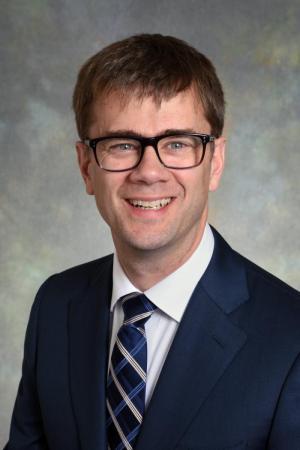
David R Hilden, MD, FACP, Governor
Mission and Vision
Minnesota ACP Mission: To foster excellence, education and professionalism among all internists in our community and to work together to shape the future of healthcare in Minnesota.
Minnesota ACP Vision: To be Minnesota's recognized leader for patient care, advocacy and education and to enhance career choice, satisfaction and collaboration for specialists and subspecialists in Internal Medicine.
Farewell from John Bundrick, MD, FACP
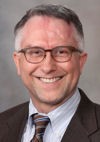
Colleagues,
It has been an incredible honor and privilege to have served as your Governor over these past four years. The caliber of individuals in our chapter is nothing short of extraordinary, and we should take great satisfaction in the level of care that we give to (and advocate for) citizens of this great state every single day.
The future of our chapter could not be in more capable hands, and I am delighted to pass the baton to David Hilden, MD, MPH, FACP. David has hit the ground running at the recent ACP Board of Governors meeting and has already been appointed to the Health and Public Policy Committee at ACP, which is one of the major committees in the College. As crucial policy debates unfold over the next couple of years, Minnesota will be well represented!
Thank you again for the privilege of serving these past four years, and I trust that you share my optimism for the next four years under the leadership of Dr. Hilden!
John Bundrick, MD, FACP, Immediate Past Governor
The MN-ACP Council

The MN-ACP Council meets twice per year and has five standing work groups including:
- Scientific Session Planning Committee
- Health Policy Committee
- Early Career Physicians Committee
- Hospitalists Committee
- Health Information Technology Committee
If you are interested in receiving information about any of these committees, please contact Minnesota.ACP@gmail.com for more information.
Award Nominations due August 1st
Nominations for two Minnesota awards may be sent to Minnesota.ACP@gmail.com no later than August 1, 2019. Please include a CV and short informational bio on the nominee and why you feel they are deserving of the award.
- Laureate award- is designed to honor those Fellows and Masters of the College who have demonstrated, by their example and conduct, an abiding commitment to excellence in medical care, as well as education, and/or research, and service to their community, their chapter, and the ACP. A Laureate nominee is usually a senior physician who has been a Fellow or Master of the College for at least 15-20 years and meets all other categories of eligibility. Past Minnesota recipients of the Laureate Award are listed here
- Community Service award- recognizes the work of members who are involved in volunteerism and community service activities. This award enables our Chapter to raise the level of awareness and promote dialogue and action in volunteerism within our state. Past recipients of this award include: Udaya BS Prakash, MD, MACP; Thomas G. McLeod, MD, FACP; Charles Reznikoff, MD, FACP; David R. Hilden, MD, MPH, FACP; Peter T. Smyth, MD, FACP; Sarah M. Kesler, MD; LaPrincess C. Brewer, MD, MPH, FACC, FACP; and Mark L. Wieland, MD, MPH, FACP.
Congratulations New Fellows!
Achieving ACP Fellowship is a mark of distinction and a milestone in a physician's career.
I'm delighted that we have so many accomplished and dedicated clinicians, and am so pleased to have many advance to Fellowship. Please join me in congratulating the following new Fellows. The following additional new Fellows were named by ACP in the last year:
Melissa Barry, MD FACP of St. Cloud, MN
M. Carolin Burton, MD, FACP of Oronoco, MN
LaPrincess Brewer, MD, FACP of Rochester, MN
Mool Chand, MBBS, FACP of Mankato, MN
Christina Dunn, MD, FACP of Eagan, MN
Richard M Elias, MBBS, FACP of Rochester, MN
Howard Epstein, MD, FACP of Golden Valley, MN
Daniel Faber, MD, FACP of Chaska, MN
Frederick O. Ferris, MD, FACP of Eagan, MN
Sarah C. Gantert, MD, FACP of Owatonna, MN
Noah I Goldfarb, MD FACP of Minneapolis, MN
Thoyaja Koritala, MBBS FACP of Mankato, MN
Evelyn Ivy Mwangi, MBChB, FACP of Worthington, MN
Dennis W Regan, MD FACP of Rochester, MN
Paula K. Skarda, MD, FACP of St. Paul, MN
Klaus K Suehler, MD, FACP of Ramsey, MN
Wade T. Swenson, MD, FACP of Fergus Falls, MN
David P Tetzlaff, MD FACP of St. Paul, MN
Mei-Ean Yeow, MBchB, FACP of Rochester, MN
Make 2019 the year you apply for Fellowship- Fellowship is a high honor and a mark of distinction and professional achievement that is recognized by your peers and your patients. If you are now a member- become a Fellow by reviewing the requirements and find which pathway to Fellowship is appropriate for your career path. Links to the requirements for advancing to Fellowship and to the application are also found on this website. In Minnesota, there are over 600 current members who are eligible for a pathway to becoming a Fellow of the American College of Physicians (FACP).
If you have any questions about completing the Fellowship application feel free to call ACP at 800-523-1546 ext. 2709.
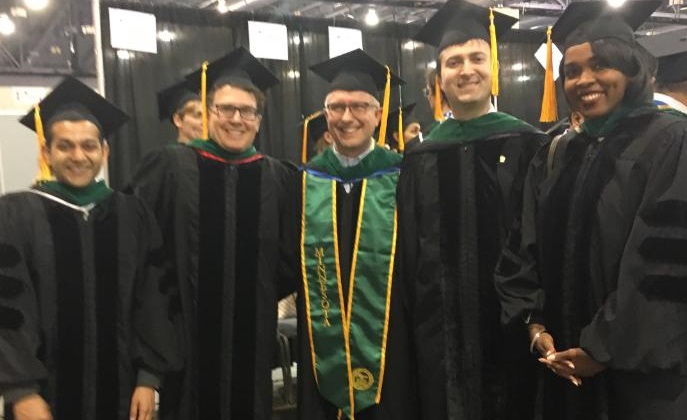
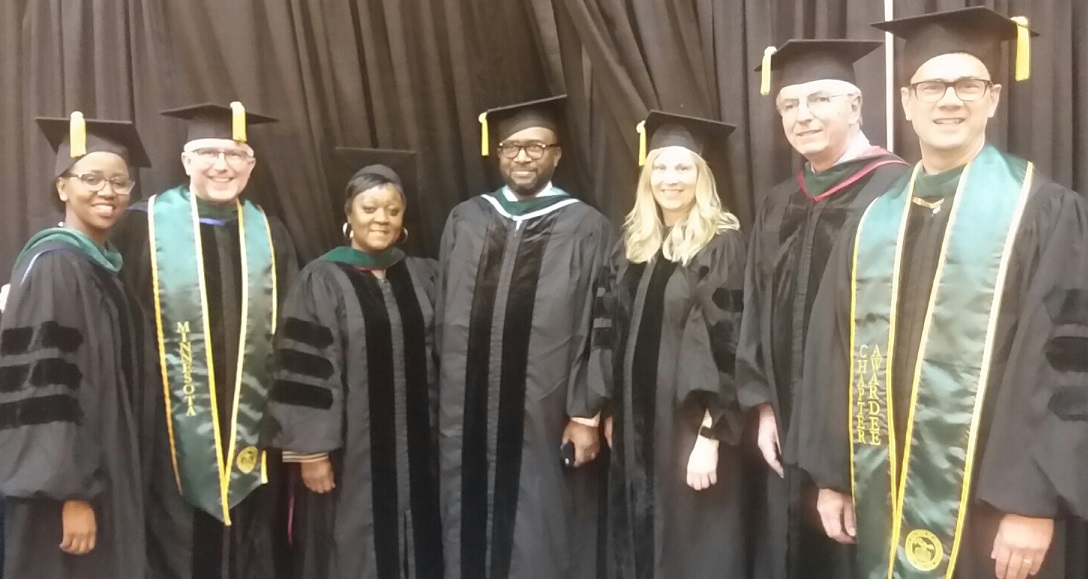
New 2019 and 2018 Minnesota FACPs with MN-ACP Governor Dr. John Bundrick and Dr. David Hilden
Two new Masters recognized from Minnesota
Mastership in the ACP is one of the highest honors bestowed by the College and aims to recognize those who have achieved eminence in internal medicine, in conjunction with some degree of service to the ACP (at the chapter or national level). Over the past 50 years, Minnesota has had thirty-three recipients of the MACP designation and we have now added two more! Drs. Robert Lohr and Jamie Newman were formally recognized recently on stage during the convocation ceremony in Philadelphia. Dr. Lohr also received further acclaim for his long and distinguished service to ACP (as Governor, Regent and most recently as Treasurer).
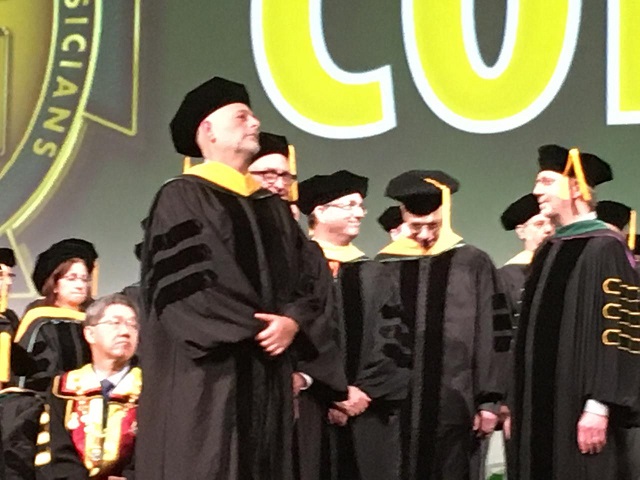
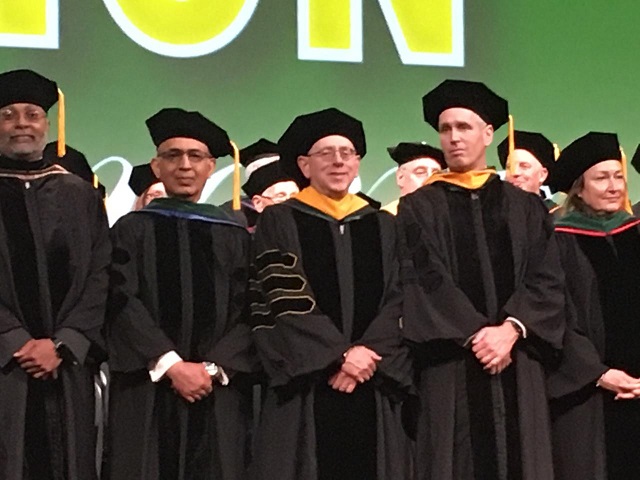
Dr. Gantzer begins Term as Chair-Elect of the ACP Board of Regents
At the annual business meeting in Philadelphia, Dr. Heather Gantzer, MD FACP formally began her term as Chair-Elect of the Board of Regents for ACP. She will begin her term as Chair of the Board of Regents at the next annual meeting in April 2020. Based on her exemplary leadership of our chapter as Governor, we are incredibly optimistic (and more than a little proud about the future of the College under her wise direction.
Health and Public Policy Update 2019
Sally Berryman, MD, FACP and Mark Liebow, MD, MPH, FACP, MN-ACP Health Policy Co-Chairs
We expect action in early May on several bills we are monitoring as noted below and will be making action/advocacy requests of you. Also listed below are the 2019 Legislative priorities identified by the MN-ACP Health and Public Policy Committee.
Improve Public Health
- The Minnesota Opioid Stewardship bills we are monitoring HF400 / SF751 were supposed to go to conference committee last week but did not. U of M medical students and Dr. Sally Berryman met with the bill authors, attended hearings and are monitoring these bills.
- Tobacco 21 ordinances have been passed in over 30 counties/cities in Minnesota. Olmsted County was the most recent county to pass the ordinance restricting access to tobacco products and vaping materials to those younger than 21.
- Gun violence provisions have been heard in the House Public Safety Committee with most of the legislative action in the House. HF 8 (criminal background checks required on firearm and HF9 (Richardson), which allows temporary seizures of firearms for mental health crises. These may be attached to a public safety bill to force a vote in the Senate, which has been much less willing to consider gun violence prevention efforts.
Improve patient health care affordability and access
- Governor Walz's budget proposal includes creating “OneCare,” a public option for health insurance, where a plan with a benefit set similar to MinnesotaCare could be purchased on the MNSure exchange by Minnesotans who buy health insurance on the individual market starting in 2023. It would have low deductibles and co-insurance. While the proposal uses funding from the Health Care Access Fund to begin operations, ongoing operations would be entirely supported by premiums. He would replace the current reinsurance plan with a 20% subsidy of insurance premiums for those buying insurance through MNSure who don't qualify for Federal tax credits. In addition, hospitals, health plans and Governor Walz support continuing the provider tax. The tax has been repealed as of the end of 2019, so legislative action to cancel the repeal would need to be passed in the House and in the Senate this session, which will be challenging.
- The target budget for health and human services funding in the House is $21 million more than the Walz budget. (Education funding is taking priority in the Walz budget). The Senate target would cut funding.
- A Direct Primary Care bill, making it easier to use that model, passed in the Senate, but its prospects in the House are uncertain.
- A member requested support for a letter regarding Minnesota Medicaid payment for hepatitis C drugs with a revision to the sobriety restrictions. Several suggestions were made to strengthen the request including consideration for sending it to the Commissioner of Human Services and the MN Medicaid Medical director.
- The Minnesota Board of Medical Practice is seeking input on discontinuing a monitoring program for physicians with HIV which has an annual cost of over $31,000/year. Additional information will be secured and a draft letter of support will be prepared.
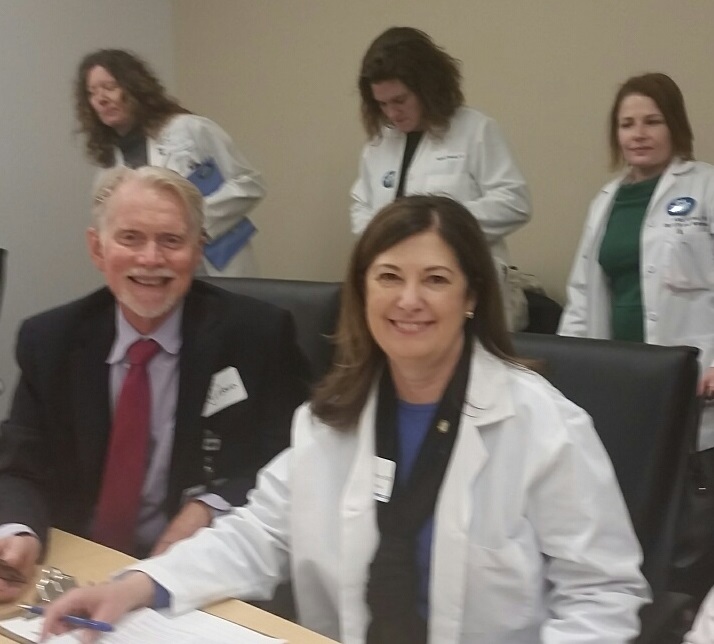
Drs. Greg Lehman and Heather Gantzer at the Minnesota Day at the Capital on February 13, 2019.
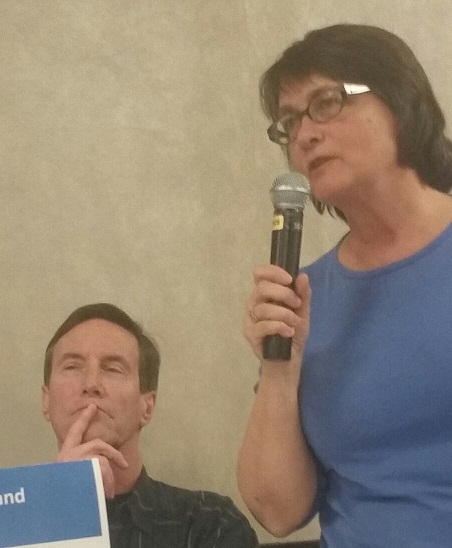
Dr. Carol Winter at the Gun Violence Advocacy meeting with MMA on Jan. 31, 2019
2019 MN-ACP Legislative Priorities:
Improve Public Health
- Reduce gun injuries and deaths in Minnesota
- Support local and state legislative efforts to pass Tobacco-21 ordinances and to reduce access for e-cigarettes to those under 18 years of age.
- Support appropriate and effective legislative/regulatory interventions in the opioid crisis, ensuring that these do not include overzealous restrictions/burdens on clinicians and patients
- Reduce suicide deaths in Minnesota and increase access to mental health resources statewide
Improve Patient Affordability and Health/Behavioral Health Access
- Support continued Medicaid and MinnesotaCare coverage and oppose cuts (to benefits, eligibility, or provider payments)
- Support continued funding of Medicaid and MinnesotaCare that ensures access to health care for all those eligible for these programs
- Support solutions for affordable health insurance for those who buy health insurance in the individual market but who do not qualify for federal subsidies. This could be a new reinsurance program or a MinnesotaCare buy-in if providers receive Medicare payment rates.
Support Minnesota Physicians' Ability to Practice
- Support electronic exchange of health information including modifications in Minnesota data privacy law to facilitate greater utility of the MN Health Information Exchange
- Prior authorization reform to reduce the burden on providers who are trying to prescribe the clinically most appropriate medications for patients.
Please feel free to contact our MN-ACP MN Health and Public Policy co-chairs Sally Berryman, MD, FACP and Mark Liebow, MD, MPH, FACP at Minnesota.acp@gmail.com with any questions.
Advocacy in Action
Interested in Health care policy and advocacy? Consider attending the 2019 ACP Leadership Day in Washington DC on May 14th to 15th. Read more information on Leadership Day. A Minnesota delegation will be attending and has scheduled meetings with MN Senators and Congressional staff.
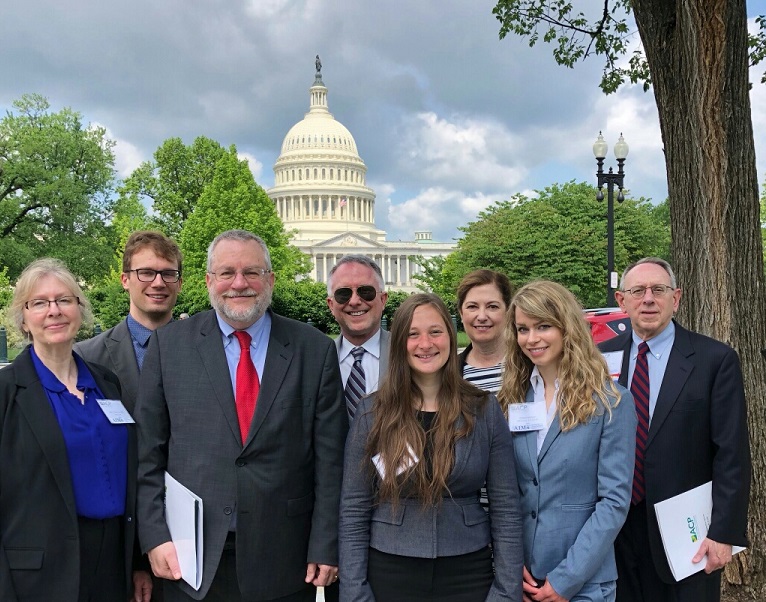
Attendees at ACP Leadership Day 2018 in Washington DC
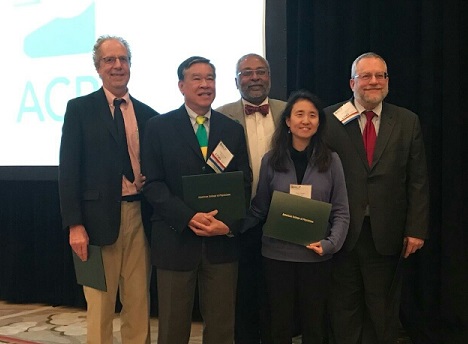
Dr. Mark Liebow was one of five individuals given Special Recognition as an “Advocate for Internal Medicine” by ACP for his advocacy at the state and federal levels on behalf of internists and our patients. Congratulations Mark!
HIT Tips: Problem List etiquette–Let's make the EMR work better for all of us!
Deepti Pandita, MBBS, FACP, MN-ACP Health Information Technology Committee Chair
What is the problem List?
- The activity where you can view a patient's current and pertinent medical and multi-disciplinary problems and record new medical problems
- The Problem list is dynamic and should be reviewed/addressed at every visit
What should or should not be on the problem list?
- It should be a list of active or clinically pertinent problems. Each problem on the problem list should have an active care plan (in overview section). If the problem is not actively being addressed, the problem would be more appropriate for the History section rather than the active Problem list.
-not for acute
-not for past medical or surgical history
-if something is very important and relevant that you may wish to code at visits but is past history- (eg h/o bone marrow transplant) that may be appropriate to keep on problem list, but ensure it is “h/o”
- Overview Section under each problem can be very helpful in communication detail or keeping track or specifics for a given patient (ie patient with depression who has tried several medications, some of which are ineffective). This is sometimes referred to as a “care plan”
- Problems should be resolved off of the problem list if they are acute problems which resolve (examples: leg fracture, acute hypokalemia, acute sinusitis, C-section 1978)
- “Acute” hospital problems should either be resolved or recoded into chronic problems.
Example: Acute MI, if it remains on the problem list, will continue to trigger Best Practice Alerts (BPAs) to fire. The correct workflow would be to recode this to Old MI after 8 weeks have passed since the event.
Acute systolic heart failure should be recoded to chronic systolic heart failure
- Problems should be coded to the highest level of specificity. This becomes even more crucial with ICD-10 and when using the problem list for encounter diagnosis coding. More specificity on the problem list leads to less calculator “popups” when coding your encounters.
- One-time diagnoses addressed at a visit should not be moved onto the problem list (eg URI)
What does the problem list do?
- Provides the list of diagnoses for billing, which can easily be moved with arrow keys to populate the Visit Diagnosis.
- Can drive BPA firing
- Can be viewed on the Snapshot
- Can be viewed by patients in MyChart or other online EMR portal
- Can link problem list to Episodes of Care and to Treatment Plan (ie anticoagulation)
Correct usage of problem list versus medical history:
- We should be actively maintaining both lists.
- The problem list in Epic should be continually changing as problems develop or resolve
- Workflow for a visit or hospitalization should include direct review of the problem list to ensure current problem list entries are accurate. “New” diagnoses for these visits should not duplicate, with mildly different verbiage, current problem list entries (example: afib, atrial fibrillation, afib with RVR, afib on chronic anticoagulation all on one problem list)
- On discharge from the hospital, the discharging physician should resolve or delete problems which are no longer pertinent or active.
- The problem list should be owned by every member of a patient's care team. It is the patient's problem list, not the clinician's problem list.
Resolving vs. Deleting
- Resolve problems that are no longer active
- Delete duplicate or erroneous entries
- Past surgeries need to be in Past Surgical History, not problem list
Problem list problems we see:
- acute problems on problem list (ie URI)
- problems not resolved after hospitalization (this is everyone's job, but especially includes pcp)
- chronic problems not added to problem list (eg patient has copd, but isn't on problem list)
- duplicate problems on problem list
(Exception might be diabetes/complications)
Why do we need to do this now?
- problem list entries include people on registries/ drive quality work (asthma, dm, ovc)
- problem list entries are used to prompt addressing/documentation/ coding of chronic persistent conditions
- It reflects professionalism to not only your colleagues but also other members of the care team and the patients.
Guided Fellowship for Resident/Fellow Members that transition to full Membership
Achieving the FACP credential is a significant milestone for post-training physicians – one that shows leadership and commitment to excellence in the practice of medicine. ACP has developed a three-year Guided Fellowship Program, which provides a framework toward meeting professional development goals, along with guidance and mentorship, in order to obtain the FACP credential. The program is open only to ACP Resident/Fellow Members that transition to full Membership each July. More information is posted here.
MN-ACP Wins John Tooker Evergreen Award at ACP Internal Medicine Meeting for I.M. on Tap and for Scientific Session webinars and livestreaming.
Dr. John Bundrick accepted the John Tooker Evergreen Award in 2018 for the Minnesota project I.M. on Tap, a networking and membership engagement program for early career physicians. He then presented the award to Amy Holbrook, MD, FACP who has been chair of the Early Career Physicians Committee for the past three years and coordinates speakers and promotion for I.M. on Tap. At the 2019 ACP meeting, he accepted the award for the Minnesota project of livestreaming the 2018 Medicine at the Margins afternoon session and the 2017 opioid sessions.
Kudos to Tseganesh Selameab, MD, FACP, Michael Aylward, MD, FACP, Charlie Reznikoff, MD, FACP and many others for their excellent work on these sessions!
Early Career Physicians
ACP's official definition of an “early career physician” is a physician who has graduated from medical school within the last 16 years AND who is not currently in residency or subspecialty fellowship training Any questions or suggestions, please contact the Early Career Physicians Chairwoman, Amy Holbrook, MD at amy.k.holbrook@gmail.com .
Chapter Vital Statistics—Membership remains strong!
Membership of the Minnesota American College of Physicians demonstrates strong membership retention (and our chapter has distinguished itself for having a high level of membership engagement). The table below shows a comparison of membership over the past five years. Thank you for your membership!
| MN-ACP membership profile | 7-2014 | 7-2015 | 7-2016 | 7-2017 | 7-2018 | 4-2019 |
|---|---|---|---|---|---|---|
| Masters | 20 | 20 | 20 | 20 | 24 | 25 |
| Fellows | 563 | 559 | 561 | 562 | 564 | 566 |
| Members | 903 | 999 | 1001 | 1011 | 1026 | 1012 |
| Residents/Fellows | 551 | 390 | 399 | 525 | 462 | 458 |
| Medical Students | 260 | 312 | 357 | 358 | 418 | 366 |
| Affiliates (MD and non-MD) | 10 | 10 | 16 | 19 | 17 | 18 |
| Total members | 2307 | 2290 | 2354 | 2,495 | 2,511 | 2445 |
Welcome New Medical Student Members!
Many thanks to the Internal Medicine Interest Group Leadership at the University of Minnesota Medical School, UM-Duluth Medical School and the Mayo Medical School for their recruitment of new members. We look forward to all medical student engagement in the chapter!
Save the Dates
- August 1, 2019- nominations due for the MN Laureate Award and the Community Services award. Please send a nomination email to Minnesota.ACP@gmail.com with the CV of the nominee for consideration by our Awards Committee.
- Sept. 1, 2019- Abstracts due for submission for the Oct. 11, 2019 Abstract competition for medical students and residents at the Minneapolis Convention Center
- Oct. 10-11, 2019 for the ACP-MN Annual Scientific Session and Pre-courses, Minnesota Internal Medicine:2019 at the Minneapolis Convention Center
How can we better serve you? Please contact me with questions or thoughts on how the MN-ACP can serve you. David Hilden, MD, MPH, FACP Governor, MN-ACP Minnesota.ACP@gmail.com

